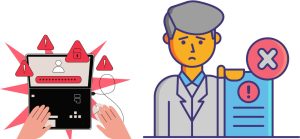Data breaches
What is it?
We speak of a data breach when personal data falls into the hands of someone who should not have the data.
In 2018, 20,881 data breaches were reported to the Personal Data Authority (AP). In 2019, there were 26,956. In 2020, 23,976 data breaches were reported.
- As a gaffe. The most common type of data breach is the sending or handing over of personal data to the wrong recipient. The loss (leaving it on the train) or theft of a laptop or USB stick is the most common type of data breach. Most data breaches are therefore the result of human error.
- Intentionally. Data breaches can also be deliberately caused by a third party. Sometimes for fun, but often to make money.
What can it mean for a sex worker?
Your data can become part of a data breach. What data and how big the damage is then if it is related to sex work is hard to predict.
But do you know that if you lose your (work) phone or your laptop with your clients' data on it, you could cause a data breach yourself? In fact, if you work as an independent contractor, you should report this to the AP as a data breach. But in practice this is unlikely to happen. It would be nice to inform those around you.
What can you do?
If you think your data is in a data breach you can file a report with the AP, but usually that notification has already been made for large-scale data breaches.
You can especially do your best not to cause a data leak(s) yourself. Sometimes it goes wrong if you send an email CC to everyone instead of BCC. But above all, protect your devices well, so that if they are stolen or lost, your, your colleagues' and your customers' data do not end up on the street.
Continue reading
There are websites where data breaches are tracked (and of course the AP also comes out with annual reports).
https://www.aboutprivacy.nl/overzicht-van-bekende-datalekken/
https://www.vpngids.nl/nieuws/de-10-grootste-datalekken-van-2021/
https://www.vpngids.nl/nieuws/datalek-bij-coa-identiteit-van-150-asielzoekers-te-achterhalen/
